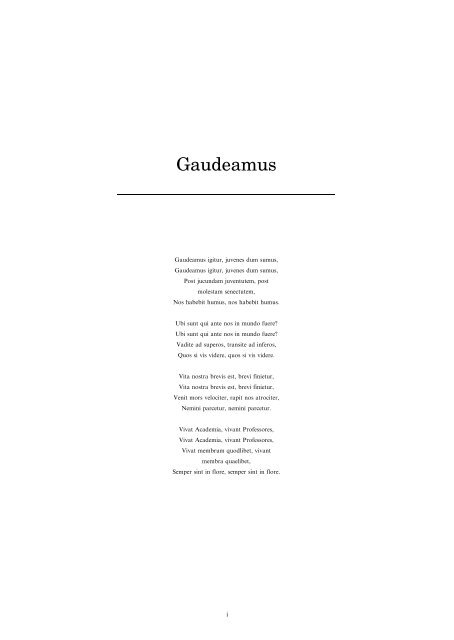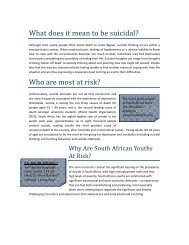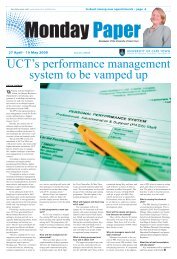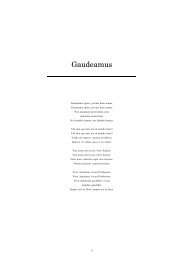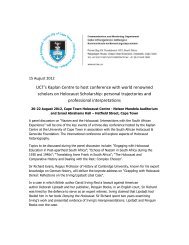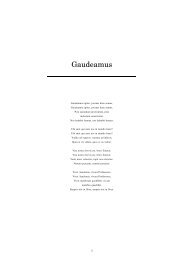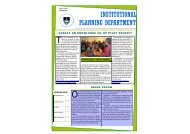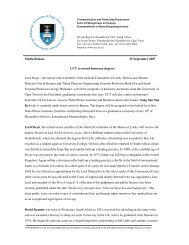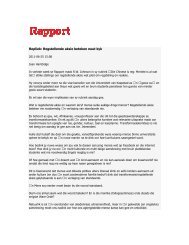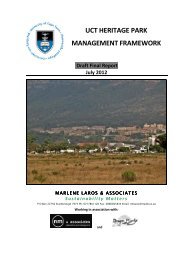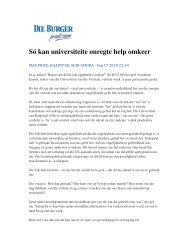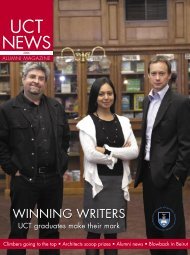Humanities 1:Layout 2 - University of Cape Town
Humanities 1:Layout 2 - University of Cape Town
Humanities 1:Layout 2 - University of Cape Town
Create successful ePaper yourself
Turn your PDF publications into a flip-book with our unique Google optimized e-Paper software.
Gaudeamus<br />
Gaudeamus igitur, juvenes dum sumus,<br />
Gaudeamus igitur, juvenes dum sumus,<br />
Post jucundam juventutem, post<br />
molestam senectutem,<br />
Nos habebit humus, nos habebit humus.<br />
Ubi sunt qui ante nos in mundo fuere?<br />
Ubi sunt qui ante nos in mundo fuere?<br />
Vadite ad superos, transite ad inferos,<br />
Quos si vis videre, quos si vis videre.<br />
Vita nostra brevis est, brevi finietur,<br />
Vita nostra brevis est, brevi finietur,<br />
Venit mors velociter, rapit nos atrociter,<br />
Nemini parcetur, nemini parcetur.<br />
Vivat Academia, vivant Pr<strong>of</strong>essores,<br />
Vivat Academia, vivant Pr<strong>of</strong>essores,<br />
Vivat membrum quodlibet, vivant<br />
membra quaelibet,<br />
Semper sint in flore, semper sint in flore.<br />
i
National Anthem<br />
Nkosi sikelel' iAfrika<br />
Maluphakanyisw' uphondo lwayo,<br />
Yizwa imithandazo yethu,<br />
Nkosi sikelela, thina lusapho lwayo.<br />
Morena boloka setjhaba sa heso,<br />
O fedise dintwa la matshwenyeho,<br />
O se boloke, O se boloke setjhaba sa heso,<br />
Setjhaba sa South Afrika ±South Afrika.<br />
Uit die blou van onse hemel,<br />
Uit die diepte van ons see,<br />
Oor ons ewige gebergtes,<br />
Waar die kranse antwoord gee,<br />
Sounds the call to come together,<br />
And united we shall stand,<br />
Let us live and strive for freedom,<br />
In South Africa our land.
DONOR<br />
ACKNOWLEDGEMENT<br />
________________________<br />
The <strong>University</strong> <strong>of</strong> <strong>Cape</strong> <strong>Town</strong> gratefully acknowledges the sustained contributions <strong>of</strong> the following partners. Their support has<br />
made possible curriculum, staff and student transformation, improved student access to tertiary education, programmes that<br />
promote social engagement and community upliftment, as well as increased research capacity.<br />
Alumni, Staff, Students and Leadership <strong>of</strong> UCT<br />
Abe Bailey Trust<br />
Albert Wessels Trust<br />
Allan Gray Orbis Foundation<br />
Andreas and Susan Struengmann Foundation<br />
Attorneys Fidelity Fund<br />
Ben & Shirley Rabinowitz Foundation<br />
BM Raff Will Trust<br />
Mr Bruce Trevor Ackerman<br />
Cancer Research Trust<br />
<strong>Cape</strong> Bridge Trust Company<br />
<strong>Cape</strong> Gate (Pty) Ltd<br />
Carnegie Corporation <strong>of</strong> New York<br />
CHK Charities Ltd<br />
Circle Capital Ventures<br />
Miss Vivien Cohen<br />
Dalib Investments (Pty) Ltd<br />
De Beers Fund Educational Trust<br />
Discovery Foundation<br />
Dr Stanley Batchelor Bursary Trust<br />
EJ Lombardi Trust<br />
Eranda Foundation<br />
Ernest Oppenheimer Memorial Trust<br />
Estate <strong>of</strong> Late George Strates<br />
Foschini Retail Group (Pty) Ltd<br />
Ginsburg Asset Consulting (Pty) Ltd<br />
Goldman Sachs Charitable Fund<br />
GlaxoSmithKline plc<br />
Guy Elliott Medical Research Trust<br />
Hasso Plattner Foerderstiftung<br />
HCI Foundation<br />
Hope for Depression Research Foundation<br />
Horace Alfred Taylor Will Trust<br />
Hospital Welfare and Muslim Educational Movement<br />
International Bar Association Educational Trust<br />
James Sivewright Scratchley Will Trust<br />
Joan St Leger Lindbergh Charitable Trust<br />
John and Margaret Overbeek Trust<br />
Johnson Matthey plc<br />
JP Morgan Chase South African Trust Foundation<br />
JRS Biodiversity Foundation<br />
Lily & Ernst Hausmann Research Trust<br />
Lorenzo and Stella Chiappini Charitable and Cultural Trust<br />
Mary Slack & Daughters Foundation<br />
Medtronic Foundation<br />
Minerals Education Trust Fund<br />
National Lottery Distribution Trust Fund<br />
New Settlers Foundation<br />
Novo Nordisk (Pty) Ltd<br />
PA Don Scholarship Trust<br />
Pearson Plc<br />
Percy Fox Foundation<br />
Picasso Headline<br />
PM Anderson Educational Trust<br />
Polaris Foundation<br />
Pr<strong>of</strong>essional Provident Society<br />
Rio Tinto Plc<br />
Roche Products (Pty) Ltd - Diagnostics<br />
Rockefeller Brothers Fund<br />
Rosalie van der Gucht Will Trust<br />
Rustenburg Platinum Mines Ltd<br />
Ruth and Anita Wise Charitable and Educational Trust<br />
SANLAM<br />
Sigrid Rausing Trust<br />
Southern African Music Rights Organisation Ltd<br />
South African Norway Tertiary Development Programme<br />
StatPro South Africa (Pty) Ltd<br />
Stavro Tsatsos Trust<br />
Stevenson Family’s Charitable Trust<br />
Thabo Mbeki Educational Trust<br />
The A and M Pevsner Charitable Trust<br />
The Ackerman Family Educational Trust<br />
The Andrew W Mellon Foundation<br />
The Atlantic Philanthropies<br />
The Beit Trust<br />
The Calleva Foundation<br />
The Claude Leon Foundation<br />
The David and Elaine Potter Charitable Foundation<br />
The Donald Gordon Foundation<br />
The Dora and William Oscar Heyne Charitable Trust<br />
The Doris Crossley Foundation<br />
The ELMA Foundation<br />
The Ford Foundation<br />
The Frank G Connock Trust<br />
The Frank Robb Charitable Trust<br />
The Gertrude Haas Performing Arts Scholarship Fund<br />
The Harry Crossley Foundation<br />
The Hermann Ohlthaver Trust<br />
The John Ellerman Foundation<br />
The Justin and Elsa Schaffer Family UCT Scholarship Trust<br />
The Khotso Trust<br />
The Kresge Foundation<br />
The Leanore Zara Kaplan Will Trust<br />
The Leverhulme Trust<br />
The Link-SA Trust<br />
The Little Tew Charitable Trust<br />
The Mauerberger Foundation Fund<br />
The Myra Chapman Educational Trust<br />
The Nellie Atkinson Trust<br />
The Nuffield Foundation<br />
The Old Mutual Foundation<br />
The Ove Arup Foundation<br />
The Petroleum Oil and Gas Corporation <strong>of</strong> SA<br />
The Raymond Ackerman Foundation<br />
The Rockefeller Foundation<br />
The Rolf-Stephan Nussbaum Foundation<br />
The Shuttleworth Foundation<br />
The Starr Foundation / Ernest and Brendalyn Stempel<br />
The Stella & Paul Loewenstein Educational and Charitable Trust<br />
The Wenner-Gren Foundation for Anthropological Research Inc<br />
The Wheatfield Estate Foundation Trust<br />
The Wilfred Cooper Trust<br />
The William and Flora Hewlett Foundation<br />
The Wolfson Foundation<br />
Tullow Oil<br />
Unilever South Africa Home and Personal Care (Pty) Ltd<br />
United Negro College Fund Inc<br />
Upstream Training Trust<br />
Vodacom (Pty) Ltd<br />
Wilfred Orr Trust<br />
The Yvonne Parfitt Trust / Dinah Stell and Family<br />
Thank you for helping UCT to pursue its vision <strong>of</strong> being a world class, research-led African university<br />
3
4<br />
FACULTY OF HUMANITIES<br />
CEREMONY 1<br />
ORDER OF PROCEEDINGS<br />
Academic Procession<br />
(The congregation is requested to stand as the procession enters the hall and<br />
is invited to participate in the singing <strong>of</strong> Gaudeamus)<br />
The Chancellor will constitute the congregation.<br />
The National Anthem.<br />
The <strong>University</strong> Statement <strong>of</strong> Dedication will be read by a member <strong>of</strong> the SRC.<br />
Musical item.<br />
Welcome by the Deputy Vice-Chancellor, Pr<strong>of</strong>essor C Soudien.<br />
Pr<strong>of</strong>essor Soudien will present Carrol Clarkson for the Distinguished Teacher Award.<br />
The graduands will be presented to the Chancellor by the Dean <strong>of</strong> the Faculty,<br />
Pr<strong>of</strong>essor MP Ensor, assisted by the Director <strong>of</strong> Graduate Studies, Pr<strong>of</strong>essor H Snyman.<br />
The Chancellor will congratulate the new graduates.<br />
Pr<strong>of</strong>essor Soudien will make closing announcements and invite the congregation to stand.<br />
The Chancellor will dissolve the congregation.<br />
The procession, including the new graduates, will leave the hall.<br />
(The congregation is requested to remain standing until the procession has left the hall)
DISTINGUISHED TEACHER AWARD<br />
The Distinguished Teacher Award, given once only to an individual, recognises teaching at any or<br />
all levels by a member <strong>of</strong> the faculty that has made a significant and lasting impression on students.<br />
Previous recipients in the Faculty <strong>of</strong> <strong>Humanities</strong> and their years <strong>of</strong> award are:<br />
1985: TL Dowdall (Child Guidance Clinic)<br />
1986: DE Kaplan (Economic History)<br />
1988: N Bakker (Education)<br />
1989: HJ Snyman (Afrikaans en Nederlands)<br />
1990: KM McCormick (English Language and Literature)<br />
1992: L Marx (English Language and Literature)<br />
J Parkington (Archaeology)<br />
N Worden (History)<br />
1993: W Mazamisa (Religious Studies)<br />
G Solomons (Classics)<br />
C Weare (Drama)<br />
1995: M Adhikari (History)<br />
1996: R Mendelsohn (History)<br />
1999: D Benatar (Philosophy)<br />
DH Foster (Psychology)<br />
WR Nasson (History)<br />
2000: JV Bickford-Smith (Historical Studies)<br />
CJ Breen (Education)<br />
2001: RS Edgecombe (English Language and Literature)<br />
H Phillips (Historical Studies)<br />
2002: AK Mager (Historical Studies)<br />
2003: B Liebl (South African College <strong>of</strong> Music)<br />
2004: HH Schomer (Psychology)<br />
2005: PR Anderson (English Language and Literature)<br />
Y Banning (Drama)<br />
2006: Z Erasmus (Sociology)<br />
E Mills (Drama)<br />
2007: J Bennett (African Gender Institute)<br />
2008: VM Everson (French Language and Literature)<br />
The following members <strong>of</strong> the Faculty <strong>of</strong> <strong>Humanities</strong> have been chosen for this award in 2009:<br />
Carrol Clarkson<br />
Associate Pr<strong>of</strong>essor in English Language and Literature<br />
Associate Pr<strong>of</strong>essor Carrol Clarkson is a passionate and brilliant teacher. She prioritizes the<br />
teaching event as singular: that is to say, what happens in each lesson will never be repeated in<br />
exactly the same way. In all teaching contexts, responsiveness on the part <strong>of</strong> the students is the<br />
medium in which the ideas can have life, in which justice will be done to the thoughts expressed.<br />
She creates and sustains that singular, responsive relation.<br />
Excelling at undergraduate and postgraduate levels in the English Department and at postgraduate<br />
level in the Law Faculty, Carrol’s impact is both broad and deep. Each teaching experience is an<br />
opportunity to create the space in which different voices can be heard, to listen carefully and to teach<br />
students to listen to each other. In these contexts, students gain fresh perspectives, and, perhaps<br />
most importantly, they discover that what you ask, and the way in which you formulate a research<br />
question in itself is critical. Grounded in its philosophical, theoretical, and aesethic context,<br />
rigorous engagement with literary theory challenges students to ask unsettling questions about<br />
their own social contingencies, to think carefully about things that could have been, and still could<br />
be, so different.<br />
Carrol demonstrates great teaching inspires excellent research. This exceptional combination is<br />
embodied best in Carrol’s development <strong>of</strong> the Coetzee Collective, a group <strong>of</strong> local and international<br />
scholars who share their passion and scholarship on Coetzee, positioning UCT as the place in the<br />
world to engage as a Coetzee scholar. She brings to all these endeavors her immense intellect,<br />
energy and capacity to communicate and her care and attention.<br />
It is thus with great pleasure and appreciation that the <strong>University</strong> <strong>of</strong> <strong>Cape</strong> <strong>Town</strong> honours Carrol<br />
Clarkson with a Distinguished Teachers Award.<br />
5
6<br />
Melissa Elizabeth Steyn<br />
Associate Pr<strong>of</strong>essor in the Department <strong>of</strong> Sociology and Institute for<br />
Inter-cultural and Diversity Studies in Southern Africa<br />
Melissa Steyn’s teaching is exemplary in two significant ways.<br />
First, it is exemplary <strong>of</strong> the idea that self- and social critique are central to both the values and<br />
practice <strong>of</strong> humanism and social justice. Her teaching practice is premised on an honest, attentive<br />
and rigorous encounter with the other, and a robust engagement with power. It is these values<br />
that Melissa Steyn embraces and models in her scholarly engagements with students. This is<br />
evident from her commitment to cultivating among her students what she calls “diversity literacy”:<br />
a necessary skill “in a world where mutuality across difference is indispensable”.<br />
Second, her work is exemplary <strong>of</strong> research-led teaching. Her students proudly confirm that they<br />
are centrally involved in every major research project she undertakes, giving them access to<br />
scholarships, rich and challenging learning experiences, and opportunities to publish their work<br />
locally and internationally.<br />
The students who nominated her for this award say: “Not only is her commitment to the growth and<br />
development <strong>of</strong> students legendary, but her manner <strong>of</strong> engagement transformed what academia<br />
means to us. [She is] not that l<strong>of</strong>ty ‘pr<strong>of</strong>essor’ who ‘pr<strong>of</strong>esses’ from on high, but someone who is in<br />
conversation with us”. They describe her as “a teacher…who touches your life” rather than<br />
someone who “simply imparts information” and as “one <strong>of</strong> the best this university has ever seen”.<br />
It is with great pleasure and appreciation that the <strong>University</strong> <strong>of</strong> <strong>Cape</strong> <strong>Town</strong> honours Melissa’s Steyn’s<br />
brilliance and commitment with a Distinguished Teachers Award.
NAMES OF GRADUANDS/<br />
DIPLOMATES<br />
An asterisk * denotes that the degree or<br />
diploma will be awarded in the absence <strong>of</strong><br />
the candidate.<br />
FACULTY OF HUMANITIES<br />
Dean: Pr<strong>of</strong>essor MP Ensor<br />
DEGREE OF BACHELOR OF ARTS<br />
Alexandra Kendall Adams<br />
Neilan Darryl Adams<br />
*Debra Lee Addison (with distinction<br />
in English)<br />
Yaseen Ahmed Akoob<br />
Corbin Lyle Alexander<br />
Llewellyn Angus<br />
Robyn Leslie Armstrong<br />
*Buyisa Siyavuya Baduza<br />
Sarah Baines<br />
*Alexander Charles Band<br />
*Brent Ryan Barber<br />
Lenoy Barkai (with distinction in English<br />
and Spanish and Hebrew Language<br />
and Literature and Music and the<br />
degree with distinction)<br />
Marsha Bernely Luane Barnes<br />
Erin Marisa Bates<br />
*Adam Saul David Becker<br />
Kim Ann Beukes<br />
Resha Biscombe<br />
Leila Ruth Bloch<br />
*Kate Bosman<br />
Anien Botha (with distinction<br />
in Afrikaans)<br />
Michelle Robyn Botha (with distinction<br />
in English)<br />
Elizabeth Hilda Bourne<br />
Zhandré Boyd<br />
Cayleigh Joy Bright<br />
Benjamin Carl Burger<br />
*Kate Ginette Burne<br />
Annalize Mariska Calitz<br />
Mia Louisa Ehrlich Candy (with<br />
distinction in English and Social<br />
Anthropology)<br />
*Tamarin Francis Carlson<br />
Kristina Frances Cassar<br />
Caroline June Celliers<br />
Tarah Childes<br />
Tecla Anthea Ciolfi<br />
William Francis Talbot Clerke<br />
Erin Coe<br />
Skye Corewijn<br />
Nabeelah Croeser<br />
Daniela Pamela Cum<br />
Teegan Leah Curitz<br />
Anushka Daniels<br />
Lynn Danziger<br />
Sherrelle Lizahn Davids<br />
Lauren Davis<br />
Inês S<strong>of</strong>ia Azevedo Pires de Carvalho<br />
*Justine Gabriela de Jager<br />
*Robyn Nicole de Klerk<br />
Keshia Lee de Wet<br />
Cayley Jade de Witt<br />
Ndibo Paphidzane Dodzi<br />
*Georgia Francis Isabelle Dowdall (with<br />
distinction in Psychology)<br />
Fadzai Dube<br />
Lisa Hazel Duckworth<br />
*Claire Lorraine Eady<br />
*Muhammad Ebrahim<br />
Emma Carla Engers<br />
*Kelly Agnes Evans<br />
Noeline Merryl Faller<br />
Tamara Christine Felix<br />
Louise Ferreira (with distinction in<br />
Spanish and the degree<br />
with distinction)<br />
Michelle Field<br />
Michael Chad Fitt<br />
Karen Louise Froneman (with distinction<br />
in English and the degree with<br />
distinction)<br />
Emma Lee Frost<br />
Winslow Carlyle Gaffley<br />
Mogamat Yusuf Gamieldien<br />
Robin Travers Ford Garden<br />
Bridget Gersie<br />
Cathy Jane Constance Gill (with<br />
distinction in Linguistics)<br />
*Warwick Beresford Gird<br />
Kyle Albert Goosen<br />
Nicole Kim Gorton<br />
Jerusha Grierson<br />
Samantha Nicole Griffiths<br />
Katie Olivia Gumbley (with distinction in<br />
English and the degree with<br />
distinction)<br />
Alison Dale Guy<br />
Claire Louise Mitford Hanley<br />
Jessica Amy Hargreaves<br />
*Carmen Hartmann<br />
Pepler Vincent Head<br />
Benjamin Alan Hemson-Struthers<br />
Muhammed Mustapha Hendricks (with<br />
distinction in Film Studies<br />
and Drama)<br />
*Nqubeko Nontsikelelo Hlekwayo<br />
Michelle Leigh Horak (with distinction in<br />
Media & Writing)<br />
Tanya Horak<br />
*Janine Bettina Howard (with distinction<br />
in German)<br />
Jessica Danielle Hugo<br />
Kim Hyman<br />
Leigh-Ann Robyn Jackson<br />
Joshua Stuart Jacobson<br />
Jennifer Gail Jansen van Rensburg<br />
Chishamiso Samantha Kafundo<br />
Amanda Unami Khupe<br />
Michelle Cathryn Kilfoil<br />
Annabel Katherine Kirkland<br />
Sophy Maria Kohler (with distinction in<br />
English and the degree with distinction)<br />
Nina Louise Krause<br />
Chiyedza Kuruneri-Chitepo<br />
*John Henry Lambert<br />
Jehan Latief<br />
Nicola Claire Lazenby<br />
James Lorimer Leach<br />
Nazmia Leite<br />
Kayli Vee Levitan<br />
Nicole Kim Lincoln<br />
Charl Linde<br />
Megan Alexandra Lyons<br />
Senzo Ntsikelelo Madikane<br />
Amanda Kudzaishe Mafukidze<br />
Namcheja Maghembe<br />
*Lindiwe Georgina Malindi<br />
Haylee Beth Maltz<br />
*Naomi Nandi Marshak (with distinction in<br />
Drama and Social Anthropology and<br />
the degree with distinction)<br />
Sibusiso Maseko<br />
Lazola Matshobongwana<br />
Audra Enid Matthews<br />
Nwabisa Joy Matyumza<br />
Sibongamandla Andile Mbete<br />
Luke William McClure (with distinction<br />
in English and the degree with<br />
distinction)<br />
Stacey Lee McGillivray (with distinction<br />
in English)<br />
Holly Victoria McGurk<br />
Lance Kyle McKenzie<br />
Brad Melin<br />
Oliver Melvill<br />
Alice Patricia Meyer (with distinction in<br />
English and Classical Studies and<br />
Religious Studies and the degree<br />
with distinction)<br />
Nodidi Thula Mgudlwa<br />
Joy Henrietta Millar<br />
Shana Miller<br />
*Bradley Ross Milne<br />
Jessica Wynne Mirkin<br />
S’Busisiwe Chantel Mnguni<br />
Lebohang Maleshwane Modise<br />
Abigail M<strong>of</strong>fett<br />
Vernon Moonsamy<br />
Jay-Allen Toni Morris<br />
Tara-Anne Moss<br />
Joanna Joy Mostert (with distinction in<br />
English and the degree with distinction)<br />
Anja Elke Müller<br />
Sibongile Debra Munyanduki<br />
Alex Myers (with distinction in History)<br />
*Thishen Kreesen Naicker<br />
Luchemba Coleen Namuyamba<br />
Mphumeleli Luvuyo Ndlangisa<br />
Stephanie Kathryn Nesbitt<br />
Ariane Dimitra Nevin<br />
Nonkululeko Nomcebo Nhleko<br />
Maryam Nordien<br />
Lauren Jenna Norton<br />
Bronwyn Joy Oliver<br />
Craig Redvers Howick Olyott<br />
Juanita Heloise O’Ryan<br />
Havard Ovesen (with distinction<br />
in History)<br />
*Alexandra Mary Paget<br />
7
8<br />
Benike Rosianne Palfi (with distinction in<br />
Film Studies)<br />
Mariam Parker<br />
Thomas James Marshall Perkins (with<br />
distinction in Film Studies and History<br />
and the degree with distinction)<br />
*Joy Thabiso Phalane<br />
Shante Phillips<br />
Pamela Jane Pike<br />
Melanie Pillay<br />
Lara Danielle Potgieter<br />
Charli-Ann Punt (with distinction in<br />
English)<br />
Michelle Rademan<br />
Nabeelah Rawoot<br />
Kayleigh Frances Rayiru<br />
*Liam Alexander Reid<br />
Wynand Roest<br />
Lethabo-Thabo Musandiwa Royds<br />
David Anthony Schilperoort<br />
*Claudia Virginia Schmidt<br />
Emma Jane Schuster<br />
Jessica Rae Sedgwick<br />
John Edward Campbell Sellier<br />
Carmelita Seoposenwe<br />
Tarryn Lea Sessions<br />
Tlhabaki Onkgopotse Setlalentoa<br />
Craig Campbell Shaw<br />
Romy Josephine Shortall<br />
Layla Sieed<br />
*Ngao Muyabe Sinyinza<br />
Kirsten Elizabeth Smart<br />
Pieter Jacobus Smedy<br />
Lwando Ngwane Sopotela<br />
Michael James Spreckley<br />
Thomas Kyriacos Stavrides<br />
Naomi Strong<br />
Tamzyn Kayle Suliaman<br />
Elizabeth Wei-Yi Sun<br />
Alex Serafini Swanepoel<br />
Rebecca Swartz (with distinction in<br />
History and Social Anthropology and<br />
the degree with distinction)<br />
Harry Tachiemenson<br />
*Jena Margaret Theron<br />
Caroline Frances Timoney<br />
Shale Edward Tinkler<br />
Shannon May Toner<br />
Zona Tshetu<br />
Lauren Francis van den Berg<br />
Jessica Clara van der Hoek<br />
Craig Jodon van Schalkwyk<br />
Matthew James van Teijlingen<br />
Jake Llewellyn Waldron<br />
Patrick Cornelius Wantenaar<br />
* Emma Mary Whitehead (with distinction<br />
in Visual and Art History)<br />
Kirsten Leigh Whitfield<br />
*Ian Richard Wiggins<br />
*Kate Rebecca Williams<br />
Sierra Adele Winegarner<br />
Jason Victor Conrad Wise<br />
John Peter Withers<br />
Zoe Rebecca Withers<br />
Belinda Wood<br />
Anya Giselle Woolley<br />
Tahlia Lauren Yesorsky<br />
In Film and Media Production:<br />
Jade Toni Ables<br />
Sian Laurelle Adams<br />
Jarrod David Allies<br />
Georgina Barrow<br />
Jo Anne Barrow<br />
Samantha Claase<br />
Jennifer Lynn Sonja Close<br />
Nella Coetzer<br />
Megan Hayley Cook<br />
Catherine Anne Dabbs<br />
Johann Sidney Davis<br />
Jessica Lauren Dawson (with distinction<br />
in Studies in Film & Media<br />
Production)<br />
*Justine Gabriela de Jager<br />
Tracy-Lee de Villiers<br />
Tamika Jade Doubell<br />
Maciej Jakub Dubla<br />
Nicole Du Preez<br />
Marlyn Collin Faure<br />
Jessica Paula Fowlds<br />
Stevie Jane French (with distinction in<br />
Studies in Film & Media Production)<br />
Katherine Leigh Goss (with distinction in<br />
Film Studies and Media & Writing<br />
and the degree with distinction)<br />
Georgia Grundlingh<br />
Pholile Nondumiso Hlope<br />
Kevin Godfrey Hereford Hoole<br />
Tafadzwa Rangarirai Hove<br />
Sarah Jean Howse<br />
Angela Illing<br />
Danielle Illman<br />
Heather Mary Ingarfield (with distinction<br />
in English and Media & Writing and<br />
the degree with distinction)<br />
Alice Lily Inggs<br />
*Mohammed Saif Islam<br />
Leanne Jansen<br />
Nicole Joy Jonklass<br />
Sehaam Khan<br />
Michael Klein<br />
Jane-Anne Kokkinn<br />
Mareike Anette Kramper<br />
Jahan Lopes<br />
Michael Gordon Macleod<br />
Mlamleli Luxolo Maki<br />
Kate McLeod<br />
*Alec-Sander Meirelles Docanto Ecastro<br />
*Natalie Barbara Milroy<br />
Jolynn Minnaar (with distinction in<br />
Studies in Film & Media Production)<br />
Steven James Mitchell<br />
Claude Hani Morcos<br />
Mudiwa Tapiwa Mupotsa<br />
*Lisa Partington<br />
Michael Pearce<br />
Lara Anne Pearson<br />
*Michelle Joan Pollard<br />
Bianca Posthumus Meyjes (with<br />
distinction in Studies in Film<br />
& Media Production)<br />
Anna Urszula Ptasinski<br />
Rochan Michele Redelinghuys<br />
Caitlin Grace Robinson (with distinction<br />
in English and Media & Writing and<br />
Studies in Film & Media Production<br />
and the degree with distinction)<br />
Caitlin Kim Robinson<br />
Stacey Claire Ryder<br />
Khahliso Santho<br />
Katleho Kano Shoro<br />
Meghan Jane Spilsbury<br />
Katharine-Anna Theodosiou<br />
Reinhard Leon van Biljon<br />
Ryan Patrick Whelan<br />
DEGREE OF BACHELOR OF ARTS<br />
(HONOURS)<br />
In African Languages and Linguistics:<br />
*Scholastika Mbava Hausiku<br />
*Given Jacqe Hlongwani<br />
*Angelika Mate Mukoya<br />
Thembisa Selda Mushipe<br />
Sibongile Saraphina Xamlashe<br />
In African Studies:<br />
*Kjell Jostein Langfeldt Lind<br />
Mxolisi Malimela<br />
In Art Historical Studies:<br />
*Maria Elena Baumann<br />
In Classical Studies:<br />
Margeaux Hendricks<br />
James Edward Sharp<br />
(First class) Hamish Gavin<br />
Douglas Williams<br />
In Development Studies:<br />
*Vivienne Anna Fenton<br />
*(First class) Kevin O’Donoghue<br />
In Diversity Studies:<br />
(First class) Emma Francis Daitz<br />
In Drama:<br />
Lamees Albertus<br />
*Katja Dorothy Hopkins<br />
Dominique Jossie<br />
Keloabetswe Hazel Lebelo<br />
(First class) Philip De Villiers Rademeyer<br />
*Cintaine Schutte<br />
(First class) Catherine Julia Scott
In English Studies:<br />
*(First class) Samantha Beckbessinger<br />
*Odette Bester<br />
Alexandre de Comarmond<br />
(First class) Katherine Rose Dubaniewicz<br />
(First class) Luz-Maria Gasser<br />
*Chantelle Stephanie Hulett<br />
(First class) Shaun Allan Kirk<br />
Melania Mancuveni<br />
Susanna Frances Moseley<br />
*Kamil Emma Naicker<br />
*Carmen Pool<br />
Farzaana La’eeqa Rahiman<br />
*Katherine Jane Sutherland Ramalho<br />
Jade Ashton Scully<br />
Ivy Shutu Musekiwa<br />
(First class) Christopher Peter Waldburger<br />
Cassandra Anne Weir<br />
In Environmental and Geographical<br />
Studies:<br />
*(First class) Emma Anne Bryce<br />
*Andreas Mothibe Mothibe<br />
In Film Studies:<br />
Parveen Banderker<br />
(First class) Francesca Bourke<br />
(First class) Aurora Patricia Drummer<br />
(First class) Mathew John Howard-Tripp<br />
Michael Howe-Ely<br />
*(First class) Matthew Jason Jones<br />
Stephanie Bianca Klink<br />
*Lydie Umba Mwadiavita<br />
Victoria Francis Peverett<br />
Mine Schreuder<br />
Ronan Lafras Steyn<br />
*Jessica Ann Tyler<br />
Myburgh Jurgens Johannes van Zijl<br />
In Film Theory and Practice:<br />
Hester Elizabeth Calitz<br />
Joshua David de Kock<br />
Thomas Maitland<br />
Kudakwashe Maradzika<br />
Jadan Kelvin Dwane McCullough<br />
(First class) Max Bertram Milne<br />
Lutho Somdyala<br />
Layla Swart<br />
Mandilakhe Mzontsundu Yengo<br />
In French Language and Literature:<br />
(First class) Karis Jade De Villiers<br />
(First class) Jennifer Anne Van Dorsten<br />
In Historical Studies:<br />
*Nelago Ndapandula Ndanyanyukwa<br />
Amadhila<br />
Talya Barnett<br />
*Brad Brockman<br />
*Zerene Ghairun Haddad<br />
(First class) Paula Nokuthula Jackson<br />
*(First class) Tara Mondesi Weinberg<br />
In International Relations:<br />
*Kelly Jo Bluen<br />
Sasha Vanja Franicevic<br />
*Serika Ramlall<br />
Bianca Maria Silva<br />
In Italian Language and Literature:<br />
(First class) Athena-Maria Enderstein<br />
Daniele Pablo Polizzi<br />
In Linguistics:<br />
Frieda Coetzee<br />
*Shanali Candice Govender<br />
(First class) Bruce Rory Wileman<br />
*(First class) Kirstin Dianne Wilmot<br />
In Media Theory and Practice:<br />
Lee-Roy Chetty<br />
*Francis Chisembe Chishala<br />
(First class) Holly Marjolijn Meadows<br />
(First class) Stefanie Muller<br />
Candice Thea Mullins<br />
*(First class) Duncan Guy Scott<br />
Zainab Slemang<br />
*Lara Stavridis<br />
Denise Joanette van Dyk<br />
Lunel van Zijl<br />
*(First class) Khiuri de-Medeiros Zucula<br />
Gizelle Zwartz<br />
In Organisational Psychology:<br />
Jacqueline Sarah Palmer<br />
In Political Communication:<br />
Kim Samson<br />
In Political Philosophy and Social Theory:<br />
(First class) Sophia Olivia Rosochalki<br />
In Political Science:<br />
Ayanda Nyoka<br />
In Politics, Philosophy and Economics:<br />
*(First class) Matthew Stephen MacDevette<br />
In Religious Studies:<br />
*(First class) Booker Thomas Alston<br />
In Social Anthropology:<br />
*(First class) Kate Christine Abney<br />
Matthew Wayne Schroeder<br />
*Jaclyn Wistyn<br />
DEGREE OF MASTER OF ARTS<br />
In Applied Drama and Theatre Studies:<br />
Katy Louise Streek<br />
In Art Historical Studies:<br />
*(With distinction) Nadja Kim Daehnke<br />
In Classical Studies:<br />
(With distinction) Paula de Castro<br />
In Clinical Psychology:<br />
Aimee Esme Jasson<br />
(With distinction) Helen Jayne Laurenson<br />
* Nicolette Inez Partridge<br />
In Creative Writing:<br />
Aniel Botha<br />
(With distinction) Johannes<br />
Nicolaas Fourie Botha<br />
(With distinction) Karen Jennings<br />
*Toni Strasburg<br />
(With distinction) Nicole Helene Strauss<br />
In English Language and Literature:<br />
(With distinction) Cheng-Wen Huang<br />
In Environmental and Geographical<br />
Studies:<br />
*Ncedo Ntsasa Mngqibisa<br />
In French:<br />
*(Dissertation with distinction) Annabelle<br />
Corinne Marie<br />
In German Language and Literature:<br />
Annette Behrensmeyer<br />
In Historical Studies:<br />
(With distinction) Natalie Jade Davenport<br />
Abigail Kabandula<br />
(With distinction) James George<br />
Rhys Simpson<br />
*Maria Teresa Zubillaga<br />
In Language, Literature and Modernity:<br />
*(With distinction) Stacey Chamberlain<br />
Sariska Riana Fortuin<br />
(With distinction) Carlo Andreas<br />
Germeshuys<br />
*Susan Helena Hook<br />
*(Dissertation with distinction) Amye<br />
Michelle Kenall<br />
9
10<br />
In Psychological Research:<br />
*Katie Rachael Bromley<br />
Sarah May Cotton<br />
*(With distinction) Christa Gelderblom<br />
In Religious Studies:<br />
*Marie Bastienne Klein<br />
In Theatre and Performance:<br />
*(With distinction) Darron Araujo<br />
*Vaneshran Arumugam<br />
(With distinction) Alude Sinayo Mahali<br />
*(With distinction) Jacqueline Rita Singer<br />
DEGREE OF DOCTOR OF<br />
PHILOSOPHY<br />
In African Language & Literature:<br />
Michael Oyoo Weche<br />
Thesis Title: Bantu and Nilotic children’s<br />
singing games: a comparative study <strong>of</strong> their<br />
value communication<br />
Michael Oyoo Weche has a BA (Literature)<br />
and MA (Literature) from Kenyatta <strong>University</strong>,<br />
Kenya. He is currently a lecturer at the<br />
Catholic <strong>University</strong> <strong>of</strong> Eastern Africa,<br />
Nairobi, Kenya. He has been studying at<br />
UCT, in the department <strong>of</strong> African Languages<br />
and Literatures, since 2007.<br />
Michael Weche’s thesis examines<br />
the aesthetic form and value communication<br />
in selected Bantu and Nilotic children’s<br />
singing games, with particular reference to<br />
the Luhya and Luo communities <strong>of</strong> Kenya.<br />
Based on the premise that Luyha and Luo<br />
children’s singing games are creative outputs<br />
that reflect the macro cultures <strong>of</strong> the two<br />
communities, he uses ethnopoetic and ethnomethodological<br />
approaches to reveal the<br />
subtle communication in the singing games.<br />
The comparative analysis reveals<br />
that children’s creative outputs are repertoires<br />
<strong>of</strong> the aesthetics, aspirations and norms<br />
<strong>of</strong> their macro cultures. Through the performance<br />
<strong>of</strong> the singing games children socialize<br />
and assimilate the superstructure <strong>of</strong><br />
their communities’ aesthetics and norms.<br />
The performance <strong>of</strong> the singing games is also<br />
significant in the social and moral development<br />
<strong>of</strong> the child. The singing games therefore<br />
become significant in the child’s<br />
socialization and can also be used in an educational<br />
setting.<br />
Supervisor: Dr Abner Nyamende (School <strong>of</strong><br />
Languages and Literatures)<br />
In Afrikaans and Netherlandic Studies:<br />
Shathley Qadir Abrahams<br />
Thesis Title: Older than language: comics<br />
as heuristic for the philosophical canon<br />
SQ Abrahams has a BA and MA both from<br />
UCT, where he began his academic career in<br />
the mid-1990s. In 2001, he became the first<br />
African comics-scholar invited to present a<br />
paper at the Congress <strong>of</strong> the Americas,<br />
hosted that year in Puebla, Mexico. His pr<strong>of</strong>essional<br />
interests in popular culture allowed<br />
him establish links with both the field <strong>of</strong><br />
Religious Studies and study emerging from<br />
Information and Communications Technologies<br />
and their prospective roles in education.<br />
His thesis examines the role <strong>of</strong><br />
medium with respect to perennial questions<br />
recurring in the history <strong>of</strong> philosophy.<br />
Specifically, his thesis contends that the apperception<br />
<strong>of</strong> such questions, and their resulting<br />
resolutions, would be dramatically<br />
altered when articulated in sequential art,<br />
rather than in simple prose. To support this<br />
statement he explores a range <strong>of</strong> aesthetic<br />
mechanics <strong>of</strong> the comics medium, and various<br />
semioideological connotative structures<br />
that reflect on questions essential to the bodies<br />
<strong>of</strong> work <strong>of</strong> philosophers ranging historically<br />
from Giambattista Vico (c. 1725) to<br />
Michel Foucault (c. 1979).<br />
To underline an axiom central to<br />
his thesis, Older Than Language closes out<br />
with a brief exercise in speculative fiction.<br />
Imagining certain twists in history (the failure<br />
<strong>of</strong> Gutenberg’s printing press to popularize<br />
learning and overturn artistic patronage,<br />
for example), “Life In Print” is a posthumous<br />
tribute to writer who redefined the role <strong>of</strong><br />
popular culture and literacy.<br />
Supervisor: Pr<strong>of</strong>essor J Hambidge (School<br />
<strong>of</strong> Languages and Literature)<br />
In English Language and Literature:<br />
Fatima Fiona Moolla<br />
Thesis Title: Individualism in the novels <strong>of</strong><br />
Nuruddin Farah<br />
Fiona Moolla obtained her Undergraduate,<br />
Honours and Masters degrees from UCT.<br />
She previously served as a part-time lecturer<br />
in the English Department and is currently a<br />
lecturer in the Department <strong>of</strong> English at the<br />
<strong>University</strong> <strong>of</strong> the Western <strong>Cape</strong>.<br />
Fiona Moolla’s thesis performs a<br />
close reading <strong>of</strong> individualism in the novels<br />
<strong>of</strong> the Somali writer Nuruddin Farah. It argues<br />
that a specific, individualist conception<br />
<strong>of</strong> the self is central to the genre <strong>of</strong> the novel<br />
as a cultural form that emerged with modernity.<br />
This individualist conception locates the<br />
sources <strong>of</strong> the self within an internal moral<br />
horizon rather than in a realm external to the<br />
subject. Against this background, the thesis<br />
explores the constitution <strong>of</strong> the self in<br />
Farah’s novels, approaching them through<br />
the alternative insights <strong>of</strong> a moral philosophy<br />
which suggests that one’s idea <strong>of</strong> oneself is<br />
formed only in orientation to an external, social<br />
idea <strong>of</strong> virtue. [The Southern African<br />
ideal <strong>of</strong> ubuntu is one example <strong>of</strong> such an<br />
orientation]. The thesis therefore draws attention<br />
to the tension <strong>of</strong>ten generated between<br />
the social commitment Farah<br />
expresses as a writer and the constraints <strong>of</strong><br />
the form <strong>of</strong> the novel he employs. It is the<br />
first critical work on Farah’s novels that explores<br />
the ways in which the ideology <strong>of</strong><br />
form may work against the grain <strong>of</strong> an author’s<br />
social commitments.<br />
Supervisor: Pr<strong>of</strong>essor H Garuba (Centre for<br />
African Studies)<br />
Sarah Rowan<br />
Thesis Title: ‘The Efficacy <strong>of</strong> Song Itself’:<br />
Seamus Heaney’s “Defence <strong>of</strong> Poetry”<br />
Sarah Rowan has a BA (Honours) in English<br />
and Linguistics and an MA in Creative Writing<br />
(with distinction) from UCT.<br />
Her thesis focuses upon Seamus<br />
Heaney’s prose writing, particularly those essays<br />
<strong>of</strong> his in which he defines the function<br />
and purpose <strong>of</strong> poetry. Taken together,<br />
Rowan argues, these essays amount to the<br />
most concerted and far-reaching <strong>of</strong> the defences<br />
<strong>of</strong> poetry that are available to us in<br />
this historical moment. She underlines this<br />
point by placing Heaney in a long line <strong>of</strong> ‘defenders’<br />
<strong>of</strong> English poetry, beginning with<br />
Sidney and including Shelley and later poets<br />
like T.S. Eliot. She further highlights the special<br />
value <strong>of</strong> Heaney’s defence by contrasting<br />
his arguments with those <strong>of</strong> other famous<br />
contemporary poets, including Czeslaw<br />
Milosz and Joseph Brodsky.<br />
Although the thesis points out that<br />
Heaney’s arguments for the importance <strong>of</strong><br />
poetry are not unique in the originality <strong>of</strong><br />
their ideas—many <strong>of</strong> these derive from the<br />
work <strong>of</strong> his predecessors—the Irish poet’s<br />
powers <strong>of</strong> synthesis as well as his stylistic<br />
gifts make the presentation <strong>of</strong> these arguments<br />
more persuasive and less an instance<br />
<strong>of</strong> special pleading than any to be found in<br />
his contemporaries. His prose style, as well<br />
as the consistent grounding <strong>of</strong> his argument<br />
in examples provided by individual poems,<br />
constitutes a witness to the pleasure and the<br />
potency <strong>of</strong> the art form which is itself both<br />
uniquely pleasurable and potent.<br />
The originality <strong>of</strong> Sarah Rowan’s<br />
own thesis lies in the fact that, while<br />
Heaney’s distinction as a poet has attracted a<br />
huge critical literature, there has been no thesis<br />
to date which looks at his distinction as a<br />
prose writer. Nor is there any which recognises<br />
the extent to which his prose amounts<br />
to one <strong>of</strong> the most coherent statements available<br />
as to why poetry matters. ‘The Efficacy<br />
<strong>of</strong> Song Itself’ is a remarkable demonstration<br />
<strong>of</strong> just this.<br />
Supervisor: Pr<strong>of</strong>essor Stephen Watson<br />
(English Language and Literature)
In Film Studies:<br />
*Kristin Diane Pichaske<br />
Thesis Title: Colour adjustment: race and<br />
representation in Post-Apartheid South<br />
African documentary<br />
Kristin Pichaske holds a Masters Degree in<br />
Documentary Film and Video from Stanford<br />
<strong>University</strong>. Before relocating to South Africa<br />
on a Fullbright Fellowship in 2004, Kristin<br />
produced documentaries for Lucasfilm/Paramount<br />
Pictures. Her work has been honoured<br />
by the National Academy <strong>of</strong> Television Arts<br />
and Sciences, the National Federation <strong>of</strong><br />
Press Women and numerous film festivals.<br />
She is currently an Assistant Pr<strong>of</strong>essor in the<br />
television department <strong>of</strong> Columbia College,<br />
Chicago.<br />
The goal <strong>of</strong> this dissertation was to<br />
examine the process <strong>of</strong> racial transformation<br />
within South Africa’s documentary film industry<br />
and to assess how the nation’s shifting<br />
identity is both influenced by and<br />
reflected in documentary film. Drawing examples<br />
from a diverse collection <strong>of</strong> local and<br />
international films, Kristin examined<br />
changes in who is making documentaries in<br />
South Africa and how, as well as the representations<br />
<strong>of</strong> race that result. In particular,<br />
she focused on how the balance <strong>of</strong> insider vs.<br />
outsider storytelling may be shifting and to<br />
what effect. At the same time, Kristin qualitatively<br />
examined the representations produced<br />
by black/insider filmmakers as<br />
compared to those <strong>of</strong> white/outsider filmmakers<br />
in order to assess the impact <strong>of</strong> the<br />
filmmaker’s racial status on outcomes. Finally,<br />
she investigated ways in which the tradition<br />
<strong>of</strong> white-on-black storytelling must<br />
change in order to satisfy the political shift<br />
that has taken place in South Africa and the<br />
cultural sensitivities that have resulted.<br />
This study draws multiple conclusions:<br />
Thanks largely to the legacies <strong>of</strong><br />
apartheid, the already high barriers to entry<br />
into the documentary field are considerably<br />
higher for people <strong>of</strong> colour in South Africa.<br />
For this and other reasons, black South<br />
Africans remain more <strong>of</strong>ten the subjects <strong>of</strong><br />
documentaries than their makers. Overcoming<br />
this barrier must be a long-term priority,<br />
as it is the only means by which an equitable<br />
plurality <strong>of</strong> voices may reach South African<br />
audiences. While racial parity must remain<br />
the industry’s ultimate goal, the intent, integrity,<br />
and approach <strong>of</strong> the filmmaker is ultimately<br />
a more significant determinant <strong>of</strong><br />
representational accuracy than the colour <strong>of</strong><br />
his or her skin.<br />
Supervisor: A/Pr<strong>of</strong>essor Martin Botha<br />
(Centre for Film and Media Studies)<br />
In Historical Studies:<br />
Laurence Neill Nathan<br />
Thesis Title: The failure <strong>of</strong> the SADC Organ:<br />
Regional security arrangements in Southern<br />
Africa, 1992-2003<br />
Laurie Nathan (BBusSci/LLB, UCT; MPhil,<br />
Bradford) is a Research Associate at UCT<br />
and a Visiting Fellow with the Crisis States<br />
Research Centre at the London School <strong>of</strong><br />
Economics. Since 2005, he has been a member<br />
<strong>of</strong> the Centre’s Management Committee<br />
and co-ordinator <strong>of</strong> its research programme<br />
on regional and global axes <strong>of</strong> conflict. He<br />
previously headed UCT’s Centre for Conflict<br />
Resolution (1992-2003); was a member <strong>of</strong><br />
the African Union’s mediation team for Darfur<br />
(2005-6) and served on the Ministerial<br />
Review Commission on Intelligence in<br />
South Africa (2006-8). His most recent book<br />
is No Ownership, No Commitment: A Guide<br />
to Local Ownership <strong>of</strong> Security Sector Reform,<br />
<strong>University</strong> <strong>of</strong> Birmingham, 2007.<br />
This dissertation explores the establishment,<br />
evolution and effectiveness <strong>of</strong><br />
the regional security arrangements <strong>of</strong> the<br />
Southern African Development Community<br />
(SADC) between 1992 and 2003. It seeks to<br />
answer the following questions: why did<br />
SADC fail to establish a viable security<br />
regime and engage in effective peacemaking?<br />
, is SADC an emerging security community?<br />
, and what is the relationship<br />
between domestic stability and security communities?<br />
The dissertation argues that<br />
SADC’s failure to create effective security<br />
arrangements was due to three major problems:<br />
an absence <strong>of</strong> common values among<br />
member states; the unwillingness <strong>of</strong> states to<br />
surrender a measure <strong>of</strong> sovereignty to the regional<br />
body; and the political, economic and<br />
administrative weakness <strong>of</strong> these states.<br />
None <strong>of</strong> these problems could be solved at<br />
the regional level because the capacity and<br />
orientation <strong>of</strong> a regional organisation derive<br />
from, and are constrained by, the capacity<br />
and orientation <strong>of</strong> its members. Contrary to<br />
the prevailing wisdom in the International<br />
Relations literature, the thesis also contends<br />
that domestic stability, defined as the absence<br />
<strong>of</strong> large-scale violence in a country, is a necessary<br />
condition <strong>of</strong> a security community.<br />
Supervisor: Pr<strong>of</strong>essor CC Saunders<br />
(Historical Studies)<br />
In Linguistics:<br />
Menan du Plessis<br />
Thesis Title: A unity hypothesis for the<br />
Southern African Khoesan languages<br />
Menan du Plessis was born in <strong>Cape</strong> <strong>Town</strong>,<br />
and obtained herBA degree from UCT. She<br />
has published novels and short stories, including<br />
State <strong>of</strong> Fear (David Philip, 1983).<br />
She has worked on African languages <strong>of</strong> different<br />
affiliations, especially on the Khoesan<br />
languages <strong>of</strong> southern Africa, which are<br />
among the most gravely neglected on the<br />
continent.<br />
Whereas current scholarship holds<br />
that the Khoesan languages fall into three<br />
distinct language groups, Menan du Plessis’<br />
thesis argues strongly for the genetic unity <strong>of</strong><br />
the KHOE, JU and !UI-TAA groups <strong>of</strong><br />
southern African Khoesan (SAK), by means<br />
<strong>of</strong> the first full-scale application <strong>of</strong> a standard<br />
linguistic approach in the comparative study<br />
<strong>of</strong> these languages. It is shown in the first<br />
stage that there are repeated cross-SAK resemblances<br />
in the morphology <strong>of</strong> those verbs<br />
most frequently enlisted for grammatical<br />
purposes in the context <strong>of</strong> multi-verb constructions;<br />
and that these languages furthermore<br />
display multiple similarities<br />
‘horizontally’ across their specifier systems,<br />
where the resemblances are <strong>of</strong>ten also visible<br />
‘vertically’, i.e. down the lists <strong>of</strong> possible<br />
exponents. These structural affinities are<br />
sufficiently thoroughgoing to warrant a<br />
working surmise that the SAK languages<br />
might be genetically related.<br />
In the second stage, cross-SAK<br />
comparative material is presented in the form<br />
<strong>of</strong> arrays. As is most <strong>of</strong>ten the case in any<br />
comparative study the study provides a synthesis<br />
<strong>of</strong> a wide array <strong>of</strong> data collected by<br />
earlier scholars. The tabulated material reveals<br />
a range <strong>of</strong> regular phonetic alternations<br />
– the existence <strong>of</strong> which in principle confirms<br />
the working hypothesis <strong>of</strong> unity within<br />
all <strong>of</strong> southern Africa’s Khoesan languages.<br />
Supervisor: Pr<strong>of</strong>essor R Mesthrie (English<br />
Language and Literature)<br />
In Religious Studies:<br />
Federico Guliano Settler<br />
Thesis Title: Religion in the work <strong>of</strong> Frantz<br />
Fanon<br />
Born in the Eastern <strong>Cape</strong>, Federico Settler<br />
was a community development worker in<br />
Port Elizabeth, South Africa, between 1989<br />
and 1991, and in Newcastle, UK, between<br />
1994 and 1997. He received the BA(Hons)<br />
in Theology and Ministry from the<br />
<strong>University</strong> <strong>of</strong> Durham in 1997. Returning to<br />
South Africa in 1998, he established an<br />
independent research consultancy while<br />
serving as researcher and occasional lecturer<br />
in the Department <strong>of</strong> Religious Studies <strong>of</strong> the<br />
<strong>University</strong> <strong>of</strong> <strong>Cape</strong> <strong>Town</strong>, where he earned<br />
the MA in Religious Studies in 2006. During<br />
his doctoral research, he was awarded an AW<br />
Mellon Doctoral Fellowship in <strong>Humanities</strong>,<br />
an NRF Equity/Prestige Doctoral<br />
Scholarship, and a Harvard South Africa<br />
Fellowship.<br />
Drawing together postcolonial<br />
theory and religious studies, Rico Settler’s<br />
thesis examines the significance <strong>of</strong> religion<br />
in the work <strong>of</strong> the psychiatrist and<br />
revolutionary, Frantz Fanon. As a cultural<br />
analyst and political activist who drew on<br />
humanist and Marxist theory, Fanon rejected<br />
religion, seeing it as an irrational force that<br />
anasthetised the oppresed and inhibited any<br />
recovery <strong>of</strong> the black self. Nevertheless, as<br />
this thesis demonstrates, religion persisted as<br />
a force that Fanon had to engage in his native<br />
11
12<br />
Martinique and his adopted Algeria. His<br />
theorising about religion was informed by<br />
Aime Cesaire’s romantic recasting <strong>of</strong><br />
religion in sacralising Africa, by Richard<br />
Wright’s adamant rejection <strong>of</strong> religion, and<br />
by Albert Memmi’s analysis <strong>of</strong> the<br />
psychological ambivalence <strong>of</strong> religion in<br />
relations between colonizers and colonized.<br />
His understanding <strong>of</strong> religion was also<br />
shaped by his encounters with Christianity,<br />
Islam, and indigenous traditions in colonial<br />
situations and anti-colonial struggles.<br />
Although he was skeptical about any<br />
revolutionary role for religion, Fanon<br />
ultimately produced narratives <strong>of</strong> the “new<br />
man” and “new nation” emerging out <strong>of</strong> anticolonial<br />
struggles that bore traces <strong>of</strong> the<br />
sacred. By uncovering these neglected<br />
features <strong>of</strong> Fanon’s work through a close<br />
reading <strong>of</strong> his texts, Rico shows how Fanon<br />
dealt with religion as an ambivalent force in<br />
the Manichean world <strong>of</strong> colonialism.<br />
Supervisor: Pr<strong>of</strong>essor D Chidester<br />
(Religious Studies)<br />
In Rhetoric Studies:<br />
Audrin Inambao Mathe<br />
Thesis Title: Persuasion as a social heuristic:<br />
a rhetorical analysis <strong>of</strong> the making <strong>of</strong> the<br />
Constitution <strong>of</strong> Namibia<br />
Audrin Mathe was born on January 4 th , 1974<br />
at Katima Mulilo, Namibia and matriculated<br />
at St. Kizito College in 1992. In 2007, he obtained<br />
an MA degree in Communication Science<br />
from the <strong>University</strong> <strong>of</strong> the Free State.<br />
He worked as a Television Producer at the<br />
NBC. In 2001, he was appointed as<br />
Spokesman to two consecutive Namibian<br />
Prime Ministers. He is currently the Head <strong>of</strong><br />
Communication at Roads Authority. In 2003,<br />
he was one <strong>of</strong> the twelve individuals from<br />
developing countries selected by the US<br />
State Department to be inducted as a “future<br />
leader”.<br />
Up to now the Constitution <strong>of</strong><br />
Namibia has been studied by students <strong>of</strong> constitutional<br />
and political history. Scholars<br />
have been interested in such matters as the<br />
structure and powers <strong>of</strong> the government,<br />
checks and balances, separation <strong>of</strong> powers,<br />
guarantees <strong>of</strong> fundamental rights and freedoms<br />
and kindred subjects. This thesis departs<br />
from this traditional angle and applies<br />
the discipline <strong>of</strong> rhetoric to the subject matter.<br />
The thesis reveals the tools <strong>of</strong> rhetorical<br />
construction <strong>of</strong> distributive bargaining that<br />
were applied during the negotiations for<br />
Namibia‘s Constitution. The thesis further<br />
reveals how the rhetorical creation <strong>of</strong> common<br />
ground influenced the outcome <strong>of</strong> negotiations<br />
for Namibia‘s Constitution.<br />
Audrin also examined the compromises the<br />
parties made during the constitution-making<br />
process by investigating specific agreements<br />
that were reached through classical exchanges<br />
<strong>of</strong> concessions. The candidate<br />
demonstrates that the drafting <strong>of</strong> the Constitution<br />
was a process <strong>of</strong> give and take and<br />
concludes that political leaders’ rhetorics are<br />
important instances <strong>of</strong> public argumentation.<br />
Supervisor: Distinguished Pr<strong>of</strong>essor<br />
P Salazar (Film and Media Studies)
Mission Statement<br />
Our mission is to be an outstanding teaching and research university, educating for life and<br />
addressing the challenges facing our society.<br />
Educating for life means that our educational process must provide:<br />
. a foundation <strong>of</strong> skills, knowledge and versatility that will last a life-time, despite a changing<br />
environment;<br />
. research-based teaching and learning;<br />
. critical enquiry in the form <strong>of</strong> the search for new knowledge and better understanding; and<br />
. an active developmental role in our cultural, economic, political, scientific and social<br />
environment.<br />
Addressing the challenges facing our society means that we must come to terms with our past, be<br />
cognisant <strong>of</strong> the present, and plan for the future. In this, it is central to our mission that we:<br />
. recognise our location in Africa and our historical context;<br />
. claim our place in the international community <strong>of</strong> scholars;<br />
. strive to transcend the legacy <strong>of</strong> apartheid in South Africa and to overcome all forms <strong>of</strong><br />
gender and other oppressive discrimination;<br />
. be flexible on access, active in redress, and rigorous on success;<br />
. promote equal opportunity and the full development <strong>of</strong> human potential;<br />
. strive for inter-disciplinary and inter-institutional collaboration and synergy; and<br />
. value and promote the contribution that all our members make to realising our mission.<br />
To equip people with life-long skills we must and will:<br />
. promote the love <strong>of</strong> learning, the skill <strong>of</strong> solving problems, and the spirit <strong>of</strong> critical enquiry<br />
and research; and<br />
. take excellence as the bench-mark for all we do.<br />
We are committed to academic freedom, critical scholarship, rational and creative thought, and<br />
free enquiry. It is part <strong>of</strong> our mission to ensure that these ideals live; this necessarily requires a<br />
dynamic process <strong>of</strong> finding the balance between freedom and responsibility, rights and<br />
obligations, autonomy and accountability, transparency and efficiency, and permanence and<br />
transience, and <strong>of</strong> doing this through consultation and debate.<br />
13
14<br />
John Derrington Simpson, BBusSc MBA PhD <strong>Cape</strong> <strong>Town</strong>


